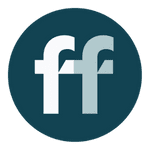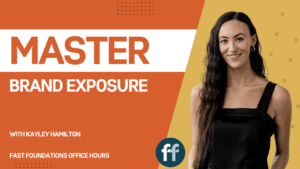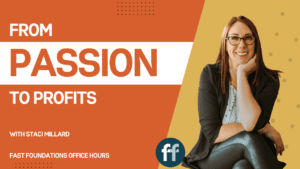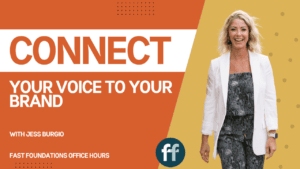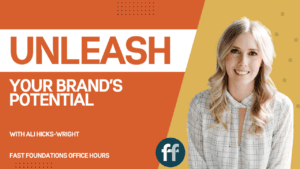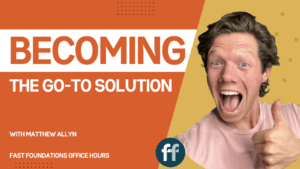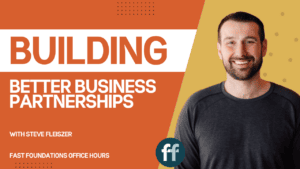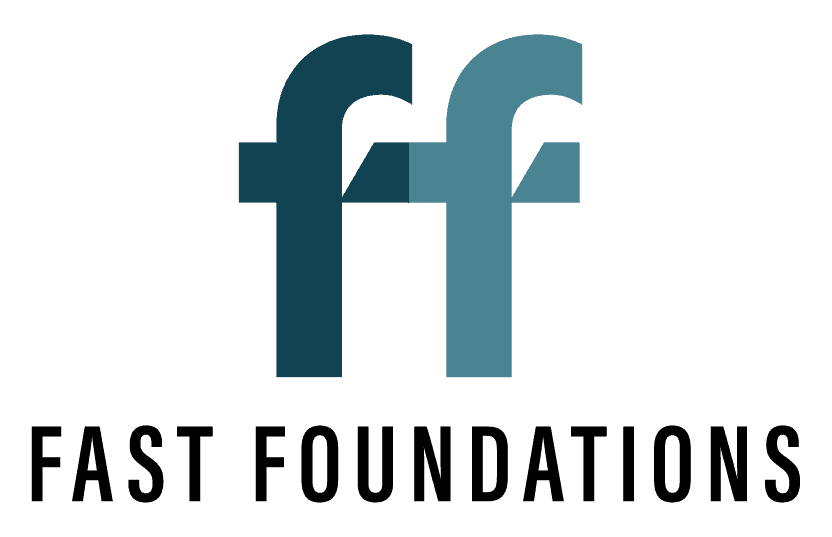Chris Harder Mentor Session: You Don’t Need A Coach You Need A Community
Show Notes
We have none other than the OG creator of Fast Foundations Mastermind, Chris Harder on the show!
In this mentor session, Chris shares why your network is key to your success as an entrepreneur, advice for those that work with a business partner (especially when they are also your romantic partner) and why every integrator NEEDS an operator in their business! Something Chris is a big believer in, and you’ll see this is a common thread in the episode, is that your NETWORK is your NET WORTH.
Chris shares lessons he learned from friends in entrepreneurship like Rob Dyrdek, what he’s gained from masterminds he’s been part of, and what it’s like building businesses with his wife Lori, his brother Nick, and his business partner he’s creating his new peer to peer lending app with.
Just like Chris says in this episode, our goal is that Fast Foundations the mastermind and this podcast give you everything you need to build your business foundation and grow FASTER!
Tag us on Instagram with your takeaways from this episode!! Chris drops some GOLD!!!
In this Episode, we talk about
- Why your NETWORK is your NET WORTH!
- Advice for business partners (especially when you are also romantic partners!)
- Lessons Chris learns from his friend and fellow entrepreneur Rob Dyrdek.
- Why we all need to be learning from an entrepreneur that’s further down the journey.
Listen Now
Key Moments
03:00 What got you, Lori, and Nick thinking about creating Fast Foundations?
06:15 The benefit of learning from another entrepreneur that is further down the journey from you.
10:30 What have you gotten from masterminds you have been part of?
12:15 Peer pressure is a good thing.
16:00 Who is an impact player in your life that has increased your belief in being part of an entrepreneurial community?
18:20 How is your NETWORK your net worth?
20:15 Advice for doing business with your romantic partner.
23:00 Learning how your partner wants to be communicated with.
26:00 What led you to make the decision to work with your brother?
29:00 What are you working on right now?
The Quickest Way to Grow Your Early-Stage Business
The Fast Foundations Community is a network of entrepreneurs who want to grow together!
Whether you are about to make the jump from corporate to launch something new, working on side hustles and want to take those full-time, just starting out on your entrepreneurial journey, or struggling to scale, we are here to support you & don’t want you to continue on alone.
CHRIS HARDER (00:00):
Here’s my belief for a Mastermind. If it’s a good one, it means that every single thing that you will need for the next six months or the next year, however long it is, is in that room. Or one introduction away. That’s a community.
JESSICA BURGIO (00:17):
What is keeping you from growing your business to the next level? I’m Jess Burgio, one of the hosts here for Fast Foundations, the podcast. Between the three of us, my co-host Jim, RT, and I have grown several businesses Scaling Beyond Seven Figures. And you know what? Not a single one of those businesses came with a blueprint for years. We poured time and resources into our businesses, from salons, tech companies, and product-based businesses navigating success and failures on our own. For all of us, though, it began to change in 2019 when we found a community of like-minded entrepreneurs and industry leaders to mentor us. That community was fast. Foundations just like the Mastermind. We’re bringing on experts in having discussions to give you tips to not only improve the foundational skill sets you need, but to also fast track your growth. We’ll dive into the core pillars of what will make your business succeed. Whether you have a brand new idea that you’re looking to turn into a business, or you’re already a successful entrepreneur looking to scale, this community is here to take you to the next level. Let’s dive in.
RT CUSTER (01:21):
Chris, thank you so much for joining me today on the Fast Foundation’s podcast. For those of you new to this fast foundation’s world and this community and this podcast, especially, my name’s RT Custer, and I am doing what we call mentor sessions. Chris Harder is my guest today. And as some of you know, he’s the original founder and creator of Fast Foundation’s Mastermind. And Chris, you’ve just been a mentor, a friend, an advisor to me for, I mean, every second I’ve known you from the very beginning. You’ve been serving me and our community, so it’s just an honor to have you on the podcast today. I’m excited.
CHRIS HARDER (02:03):
Well, Rt, listen man, it’s, it’s an honor to be on it. I consider you a dear friend. I consider you a brilliant entrepreneur. I think you’re one of the best storytellers in the entrepreneur world out there, and you’ve already been there, done that. You’ve walked the walk with your incredible watch brand, right? There’s some of my favorite watches, Vortic, and you’re, I know you’re doing some pretty big things with that coming up as well that I won’t talk about right now. But the whole point is it’s an absolute honor to mix it up with you and that you guys took this Fast Foundations torch and you didn’t just carry it on, you took a product and you turned it into a brand, into, into a real tangible brand. And it’s just awesome to see what you guys have done with this thing.
RT CUSTER (02:40):
Well, thank you, sir. And I, you know, it is, it’s just an honor to, to carry that torch and, you know, I’m, I’m trying to, I’m trying to carry it as, as well as I can. And, and Jim and the rest of the team also feels that honor and, you know, we love still mixing it up with you and, and how involved you still are and everything, even though, you know, for, for the, for the good of the group, for the listener, we bought, um, fast Foundation’s Mastermind from Chris and Lori and Nick Harder, who originally founded it. And so that happened. It’s crazy. I I commented on that Instagram post earlier this morning, Chris, like, of, can you guys believe this was only like eight months ago that we actually, eight or nine months ago that we actually pulled the door on this
CHRIS HARDER (03:17):
No, I can’t believe that. That’s crazy.
RT CUSTER (03:18):
It’s crazy how fast these things have come together. And I would, my, my first question, what I wanted to, to kind of document here, Chris, is just like, take us back to when you and Lori and Nick first started talking about Fast Foundations. Like, was this a dinner conversation? Like, was this an advice, like somebody told you, Hey, you should start a mastermind for entry level entrepreneurs. Like where did Fast Foundations come from and what was that like, you know, startup story, like how did you guys get this off the ground and what was that like for you?
CHRIS HARDER (03:52):
I can tell you exactly where it was born from. It was born from the need that it now serves. You know, we had our elite mastermind and our elite mastermind was for anybody who has a business that’s making $500,000 or higher. And I had so many people that were podcast listeners or Instagram, uh, peers or, you know, however they, they followed me or found me. I had so many people that would reach out and say, Hey, I don’t qualify for your mastermind yet. Where could I go? I’m making a hundred grand. Hey, I don’t qualify for your mastermind. Where can I go? I’m making 50, or I’ve got a brand new idea and some money to spend on it, or I’m making a quarter million where, and I had nowhere good to necessarily point them. Now that is not to disparage anyone else’s masterminds, but when I make a recommendation for someone to go and invest in somebody’s coaching, no matter what form it takes, that recommendation is like me giving up my reputation,
(04:47):
Yeah. I would be distraught if I said, Hey, go join such and such. And they said, Hey, it wasn’t that good. I would feel like I took their money by making that recommendation. And so I wasn’t comfortable making recommendations to masterminds that I didn’t know what was going on behind the scenes and I didn’t have any qu quality control. And so we built it from the need that kept showing up, and that was where should I go? I said, you know what? Come here. We’ll create this. And it’s one of our favorite groups of entrepreneurs to mix it up with. So you think we would’ve started there, but as life has it, we just started with the one that was $500,000 and above for earners. But boy, when we started this thing, we loved it. Everything from the, the q and as, the live q and ass that we would do, that was always my favorite part. Totally matter of fact, that said, so many times I’ve said, if I could just build a career outta jumping on the Zoom with a couple hundred people and just answering their questions live for a couple hours, that would be my all time favorite career. Right?
RT CUSTER (05:39):
Dude, That’s, son much fun
CHRIS HARDER (05:40):
We loved.
RT CUSTER (05:41):
It’s like, I, I’m glad you said that, Chris, cuz it’s, for me, it’s a mastermind and, and you and I as, as the, the head of it and, and putting it on and, and curating this experience for people, you know, we’re so focused on giving them that experience that they get from each other, from the speakers, from, you know, the, the rest of the team from the events. But there’s so much joy from like literal, I just called it, uh, group coaching at this point. like we just hop on q and a and, and one of the new things we’re doing this round is we called it Office Hours. And so myself or Jim or some of our team, we’re just gonna hop on a Zoom and the members of the Mastermind get to just hop on with us and ask us anything. You know, just like, what, what can we help you with? And those sessions have been so validating cuz it’s like we try to stay ahead of those members so that we can teach every, everyone something. And it’s so cool to realize like, I’m not that much farther ahead than these people and, but I can still really move the needle for them with just one little answer that they really need. That one little nugget or that one little question or connection, you know, that you and I can make for ’em. And so I
CHRIS HARDER (06:52):
I Wouldn’t discount
RT CUSTER (06:53):
Yes
CHRIS HARDER (06:54):
I wouldn’t Discount where you are in your journey, by the way, I, you’re much further along in your entrepreneurial journey. Think about the incredible company of Ford, this this multimillion dollar physical product company, one of one of kind, right along with your other ventures that you’ve done. You’re quite a ways down the rails. But the point is, when you take that knowledge, everything you’ve learned through your ups and downs, boy have you had some ups and downs. When you take that knowledge and you package in a it in a way that is easy to digest, meeting people where they’re at, feeding it to them in the way that they want to absorb it. And that’s what I love about Fast Foundation’s Mastermind, right? There’s everything from one-on-one coaches to studying on your own library to office hours, to the group things to the in-person things. So everybody, no matter what your learning type is, you’re gonna be able to absorb it.
(07:38):
When you do that, you’re not just running a business, yeah, it’s profitable, but you are doing a service saving people from catastrophic decisions, saving people from wasting money, saving people from years of slow starts saving people from maybe moments where they would quit a business that they were actually meant to be in. Had they just gotten over that hump. Saving people from feeling like they’re the only one that’s struggling. I’m telling you, if I could only do one thing to learn about business, it would be a mastermind because it fits everything from the group factor to the one-on-one factor and all the other pieces that you need in between.
RT CUSTER (08:19):
So one of the, I was talking to Alex Street, who’s a, you know, a former member, alumni of Love him Fast Foundations, he’s a coach for us now. And he, I asked him, Alex, why did you join Fast Foundations back when the Harders were running it? And, and I was all, I was a member at the same time as him. Like, what made you join a mastermind and what made you get into it? And he said, uh, our other friend and alumni, Joey Spears told him, you don’t need a coach, you need a community. and Chris, I just wanted you to a, accept that cuz you built the community that Joey was recommending. So, so that’s amazing and thank you for that. But also when you hear that you don’t need a coach, you need a, a community, I mean, you’ve been a part of a ton of masterminds, you’ve done coaching, you’ve been coached. What does that mean for you and, and and what does that look like for you when you make decisions like that between coaches, masterminds and other similar things?
CHRIS HARDER (09:18):
Here’s what, here’s what it means to build a community. It means people you’re actually gonna exchange business with tips, with energy, with. And I’ll give you real examples. You just out the blue mentioned two guys that I love, Alex Street and Joey Spears. I wouldn’t know these gentlemen if we hadn’t created Fast Foundations, right? First they joined Fast Foundations came in, we got to meet ’em, I got to get to know them and I realized, I learned how talented they were. like Joey is a branding expert and we’ve not only recommended him to other people, but we’ve hired him ourselves. And I wouldn’t have been able to, to know who to hire without seeing his work as he came through Fast Foundations. Alex is one of the greatest in the world for helping you learn how to craft your story and be a better speaker.
(10:00):
We have recommended him to so many people. Cause that’s one of the areas where people struggle the most. I wouldn’t have known how good his work is without working on his work with him in Fast Foundations. That’s what it means to be a community. A community isn’t Hey, I knew you for six months, thanks for your deposit. I sure hope that you learn something on the way out the door. That’s not a community. A community is an actual ongoing exchange. Just like these two gentlemen that you mentioned where we have given them so many business, uh, so many business opportunities. We’ve done business with them. Put our money where the mouth is. I’m telling you, here’s my belief for a mastermind. If it’s a good one, it means that every single thing that you will need for the next six months or the next year, however long it is, is in that room. Or one introduction away. that’s a community.
RT CUSTER (10:46):
A hundred percent. I love that. Thank you Chris. On that note, since you’ve been in and you host your own, I mean the elite mastermind that Jim and I are in, what makes you so passionate about Masterminds and and what have you gotten from the masterminds that you’ve just been a member of that you now apply in yours?
CHRIS HARDER (11:06):
Here’s what I’m passionate about them. It’s damn hard to find people to understand you when you’re an entrepreneur. It’s easy. If you live in LA it’s easy if you live in New York, right? They’re, they’re, they’re, there’s dense populations there of entrepreneurs. Let’s say you live in Green Bay, Wisconsin. Let’s say you live in Colorado Springs. Let’s say you live in Iowa or Kansas City or something. Yeah, there’s entrepreneurs there, but it’s more difficult to find people that want to grow as fast as you dream. As big as you mix it up with you do business referrals back and forth. It’s more difficult to find. And a mastermind is a container where everybody wants to do exactly that. That’s why it’s, uh, why I think they’re so valuable. Why is it so important to me is because my brand, my show, my podcast would not exist if I weren’t in a mastermind when we brought it to life.
(11:58):
You know, I had bought the domain name Right now my podcast is called the Chris Harder Show, but before that, everyone knew it. As for the love of money, I bought that domain name for the love of money for $18,000. And guess what I did? Did I take action right away, build the show, build out the brand? Nope. I kept putting it on the back burner for a year. Matter of fact, my wife’s favorite joke is she’d be like, Hey Chris, remember we spent 18 grand on that domain name? You never gonna do anything with it. And I wanted
RT CUSTER (12:24):
For the love of that money, where’s my $18,000
CHRIS HARDER (12:27):
I Knew was important. Exactly right, Wanted, knew it was important. But RT I wasn’t making it a priority cuz I would sell myself on this is better or, or sorry, this is more important right now or that’s more because we’re all busy. So guess what happened? I get into this mastermind and I tell the group on the, in the very first session, you know, we’re going around, Hey, what do you wanna do? What do you wanna bring to life? And I said, well, I bought this domain name for the Love of money. And it’s a show where it really teaches that when good people make good money, they do great things. And it, you know, puts that on a stage. And they said, great. When’s it coming up? I, well I haven’t really done, you know, launched it yet, blah, blah. Well great. When’s it coming out by?
(13:04):
I’m like, oh, you mean like you want a date <laugh>? They wanted a date. So we chose a date and then said, great, what’s the next step you have to do to get it going? Eh, I probably have to do this. No, no, no. What is the next step you need to do to get it going? Oh damn, they mean it. Okay, I need to do blank. Okay, great. When are you gonna do that? And they ended up building not only my date that I was gonna have it launched by, but step by step when I was gonna have each thing done to make sure that it got done. Then it didn’t stop there. Some of them put it in their calendars to follow up. Hey, did you get your podcast art done by today? Hey, yeah. Did you get your intro and outro recorded today? Hey, did you,
RT CUSTER (13:42):
Oh, those are the worst texts. Especially if you didn’t do it. You’re like, your friend that in your mastermind is like, yo, do you do this thing? And you’re like, oh shit. <laugh>
CHRIS HARDER (13:52):
Rt, there is nothing more powerful than peer pressure. Peer pressure has a negative connotation. It’s like in school when they’re like, Hey, you know, eat that dog poop and they’re peer pressuring you to do it. <laugh> as an adult. The opposite.
(14:04):
It’s different.
(14:05):
It’s, it’s, it’s the opposite. It’s the pr you wanna perform in front of your peers. They’re the last people you wanna let down. Right? And so my show, my brand, this multi multimillion dollar juggernaut that exists today would’ve continued to be a back burner thing that might have never come alive if they didn’t make me pick the dates, create the actions, and hold me accountable.
RT CUSTER (14:28):
I I love that, Chris. And, and it’s so, it’s so true. And that’s, that’s what you did for me in Fast Foundations. And that’s why I’m, that’s why I’m here. That’s why I get to, to own it and carry the torch. I I think because I mean, from the moment I met you, you were like, dude, a charge more for your watches. And when I say more, I mean like three times more. You’re really messing up <laugh>.
CHRIS HARDER (14:51):
Cause I saw what they were
RT CUSTER (14:52):
and I started doing that and so, you know, now it’s actually a profitable business. And so thank you for that. But also, you know, we just put out an email today talking about, like, I shared Vortic Watch Company’s email marketing journey and I learned all of that from Nick and basically Nick said something at one of the Fast Foundations events to the point of like, if you don’t have an email journey and an automated newsletter you’ve already lost, like get just at least a fricking welcome series of a couple emails. And I built that during Fast Foundations. It’s been running for three years and it’s just, it’s a money printer now. You know, and it’s just, and that it all came from, from people in the mastermind, people leading the mastermind saying the same thing over and over again. And then, and then the follow up, the accountability and that you’re totally right about peer pressure. It’s like that used to be a negative thing, but I want that. I need that. I think we all do. We need more peer pressure right now because it’s hard to find motivation sources that work that well.
CHRIS HARDER (15:53):
<laugh> actually RT, it’s more important than ever. Here’s why. Ever since 2020 what happened, we all went and started working from home and working from home. We got real lazy and real comfortable. Now even the most motivated individuals, they are doing less when nobody is watching than when somebody is watching. Peer pressure is a superpower. Surround yourself by it. Either assemble it yourself or pay for it by joining a mastermind. But either way, peer pressure is a superpower.
RT CUSTER (16:23):
A hundred percent. So somebody on our team gave me this really great question to ask you, and I don’t, it’s such a good question, I don’t wanna mess it up. So I’m gonna glance down for a second. Who has been an impact player in your life that’s increased your belief in being part of an entrepreneurial community?
CHRIS HARDER (16:41):
Oh, I would, there’s so many. I don’t wanna leave anybody out, but I would have to say Rob Dirdeck. Um, you know, most people know him as the guy from Robin, big way back Ben, when the show, you know, the skateboarder. Totally. And then everyone now knows of him as the host of Ridiculousness. But what they don’t know is he’s one of the most brilliant entrepreneurs that has one of the most successful VC incubator firms that you could ever imagine. And everything from the way they create culture to the timelines that they build businesses with, to the high quality people that they insist on surrounding themselves with, it’s, it’s high quality or nothing. Right? There’s no, no compromising whatsoever there to the way he lives his life with intention. Cuz to me, entrepreneurship isn’t just building a business, it’s building a life that supports the business you wanna build without sacrificing a good life. And he is the pinnacle example for measuring everything from his health to his relationship. He’s the best dad I know. He’s the best husband I know the way he lives his life in every aspect that is someone who’s had a really big impact. Uh, every time he gives me advice, every time he says, yes, do this, don’t do that every time he’s generous enough to spend a little bit of time making my life better. That’s just one of many examples, but one that I’m really grateful for.
RT CUSTER (18:06):
Well, I’m grateful for the fact that you speak about Rob Dirdeck is in the same way that I speak about you. So I’m grateful for you, Chris. And that was, that’s, he’s such a great, you’re totally right. Great example. And I’ve never met him, but I’ve listened to probably 50 hours worth of podcast material from, from him and trying to, trying to digest that and the, the methodology he puts into that optimized lifestyle is, is inspiring, I think to, to everyone. So great, great. Um, example of, of what my next question, which was you, they say your network is your net worth. And you say that all the time and that’s like something that we try to tie into fast foundations and, and the elite mastermind, all that stuff. What does that phrase mean to you and how do you put it into action in your life now?
CHRIS HARDER (18:55):
I call it relationship capital RT. I think relationship capital is more important to accumulate than good old fashioned capital. Capital, right? Like money. And here’s why. The difference is this, if you go broke your relationships, your relationship capital can rally and raise money for you to start a business. Or they can rally and say, Hey, I got your website. Hey, I’ll do your sales copy. Hey, I’ll do your branding. Hey, I’ll do this. Or when you feel stuck, sometimes you can’t buy your way outta stock. Do you know how many people I’ve seen spend 50 grand, a hundred grand on marketing campaigns or you know, specific coaches or you name it thinking that would get them unstuck? And it doesn’t. So you can’t buy your way outta stock all the time, but with enough relationship capital, you can turn to enough people to tap into their expertise and get unstuck.
(19:47):
Right? And the entrepreneurship is a lonely journey, man. Even if you have a team, even if you have employees, hell, even if you’re doing it with your wife or whatever, it’s a lonely journey and it’s tough. And that relationship capital, they’re gonna kick you back in the game when you feel like quitting, they’re gonna kick you back in the game. When you forget who you are, they’re gonna kick you back in the game When you say, you know what, maybe I wasn’t meant to do this. They’re gonna shake you by the shoulders, they’re gonna remind you who you are, they’re gonna remind you how far you’ve come because we tend to forget that we keep moving the finish line and they’re going to make sure that you stay in the game that you started. I’m telling you, relationship capital is going to make or break every aspect of your life.
RT CUSTER (20:30):
A hundred percent. A hundred percent. Thank you. Chris, you mentioned doing business with your wife, and for you, that’s Lori. You know, you, you built Fast Foundations with her and with Nick. Take, take us back to that, that time. And there’s a lot of people in our audience that do business with their partner, um, and they have business partners and sometimes the romantic partner is also the business partner. How have you and Lori specifically navigated that and what did that look like, especially years ago with, you know, a new startup like, like fast foundations?
CHRIS HARDER (21:07):
You know, I always say there’s a blessing and a curse to running businesses with your romantic partner. And it is this, the blessing is that it gives you something extra to have in common. It gives you something extra to dream about. It gives you a common goal, a common target to lock arms and go chase down and then celebrate. When you get to accomplish things together, those things enhance a relationship. But then it gives you, on the flip side a new set of challenges that regular relationships don’t have to deal with, right? You have to talk about unsexy things like marketing budgets and sales numbers and failures and hiring and firing. And you have to navigate those things together when not every romantic partner should necessarily be navigating those things together. Some of those things should be left for business partners and then come home and get to be a different type of partnership.
(21:58):
So not everyone is cut out to be romantic and business partners, but the ones that are and the ones that get it right for, and here’s what it looks like getting right, checking your ego at the door, uh, not incorporating personal life things into the business decisions like, well, I’m not gonna budge on these sales numbers because you haven’t done the dishes in a week, right? <laugh> like, listen, seep in, I’m serious listening. Seep in. So you gotta be. check that at the door. Leave personal life aside and have really great containers built in to make sure that you remain a wonderful romantic couple. Lori and I have non-negotiable walks in the morning that we start our day with, we have non-negotiable walks in the evening that we end our day with. These containers are where we know we can start to morph back into a romantic couple again after doing battle and battlefield together all day.
(22:48):
And by changing our physical state, then we get to change our mental state and change who we are together and how we show up together. It’s having practices like that in place that you are not skipping from hell or high water that are necessary. Now I’ll tell you when I came home, so most people don’t know, uh, I used to work for HSBC Bank and then when the recession hit, I lost that job and it was a great career. I was one of the fastest rising executives in the entire company in the world’s biggest bank. And when I lost that career, I took a little partnership and a little mortgage brokerage and we grew that thing quickly at the tail end of the recession turned into a mortgage bank, we were just killing it. But as we grew, my partner and I, our differences grew and we wanted to be dif very different types of leaders.
(23:30):
So then I sold out my portion of the bank to, to my partner Todd. And I came home and I said, Hey babe, good news. I’m coming home and I’m gonna help you build your business and grow your brand and everything you are good at. I’m not, and everything I’m good at, you’re not. And it’s gonna be amazing. And the first six months was hell. I mean, she didn’t know if we were gonna make it as a couple. Because I came home and I was used to what this masculine banking type a type of society. So I’d come home and I’d take the shortest route to a message possible. And that’s not how Lori receives messages. She wanted to receive messages in a different way that made her feel more empowered, et cetera. And at first, and I look back, and this is so dumb of me, but at first I was like, that’s stupid.
(24:09):
Why do you have to have things said to you this way or that way? But you know what, now I realize how important it is. It’s not whether your message is right or wrong. It’s whether you are saying it in a way, communicating in a way that your partner is able to receive it or not. That’s what makes your message valuable or not valuable. So we role played rt. We literally role played, how do you want me to talk about sales numbers? How do you want me to talk about budgets? When do you want me to bring them up? What are triggering words for you? And we didn’t just like make this list. Once we worked on it, we practiced it and once we ironed out our communication, everything else started to fall in line and we crushed it.
RT CUSTER (24:48):
It’s, it’s funny when the, the things that people say that you should do actually end up working and, and work out like it’s a Lindsay and I have been through all of all of that as well. Very, very different but similar. And thank you for sharing. Like that’s just hearing that as extremely valuable and, and invalidating as a reminder that I need to go home and continue the conversation with her. And, and it’s a continuous conversation. But yeah, we’ve, we, we had many, uh, a couple’s counseling and a individual therapy and a, you know, uh, a hard conversation on a walk of just like that thing you said, I understand why you said it, but I’d really appreciate it if you said it differently next time and also just not then not at that particular moment like I was just doing, you know? But if you don’t say it, if you don’t communicate and you just sweep it under the rug, I mean, that shit erupts
CHRIS HARDER (25:41):
<laugh>, Lori and I have a great, hey to that point. Lorena have a great policy as this. We put things out when there’s smoke, not when they’re a fire. So we’re constantly love that communicating early and often. Hey, I didn’t like how that sounded, I didn’t like how you said it. This wasn’t what we talked about in terms of community. We put things out when there’s smoke, not when they’re fire.
RT CUSTER (26:00):
I love that. So on the same line of family and working with family, let’s talk about Nick. When I joined Fast Foundations, pretty much what all of us left that round with was, I need a nick, how do I find it? A nick,
CHRIS HARDER (26:13):
It became a noun, a nick. It,
RT CUSTER (26:15):
It was a, it’s just a nick, you know? And I think what, without telling the whole story, basically what we all needed was a coo o integrator, a right hand, you know, someone to go and, and execute all the crazy visionary stuff that, that people like me and you Chris, get after. We need someone that can go execute those things. And for you, that, that seems to be and has been Nick. So how did that come about? How did you decide to work with Nick and, and what’s that been like? Because you still seem to be great brothers friends and you work well together from the outside, at least
CHRIS HARDER (26:49):
RT, this is one of the things I’m most grateful for in life. And one of the things I’m most proud of in life is that Nick and I get to both build businesses together and have a great friendship and brotherhood together. Most people, you know, they advise you don’t work with family, don’t work with family, but we’ve always put family over everything else, family over profit, family over, right. Family first. Business close second. And that’s been a great policy for us. And we’ve never had any falling outs that we really, again, we’ve never gotten past smoke, we’ve never turned into fires. And it’s because we honor each other’s talented talents. Now, the way, the reason it works is because if you remember, if, if anyone’s ever read the book, um, is it rocket fuel with integrators and visionaries? Go out, read that rocket
RT CUSTER (27:38):
Traction, traction and rocket fuel are both really great ideas. yeah
CHRIS HARDER (27:41):
Nick is a true integrator, meaning he loves the details, he loves the intricacies of timelines, he loves moving things along those timelines. I can’t stand details. I’m a visionary, I’m a dreamer, a big thinker. I come up with ideas that other people can’t come up with, and I’m able to paint that vision and sell people on that vision. But if you ask me to go out and integrate that vision myself, I won’t do it. And say the opposite is true with Nick. That guy will implement anything. He’ll find a way he can fix everything from a broken car to a broken cabinet, to a broken sales funnel. It’s amazing how his mind works. But amazing, if you asked him to paint a great big, audacious vision, he’s gonna paint a very small, careful, safe, realistic one. And so you need the visionaries to be crazy visionaries and they’re, you need them to not mess up the details. And then you need the integrators to execute all the details and bring the plans to life, but you can’t necessarily rely on them to stretch the field. And when you get both, it’s such a beautiful marriage. Not that married to my brother.
RT CUSTER (28:47):
Yeah, well I was gonna say, and, and you got, I think, so lucky and, and blessed, like you said, that, that that also happens to be your brother and friend. So, um, that’s fantastic. Chris, I want to call these sessions, these podcast episodes, mentor sessions. I look at you as a mentor, all the other people that I’m gonna bring in for these types of episodes, I, I look up to, I want them to be, you know, speakers for us, teach us something. You’ve taught me, and I’m sure the audience a lot just in in this last 30 minutes or so, but how can we help you? What are you working on right now? What’s your next thing? Obviously you have the elite mastermind, but, but what are you working on now and is there anything I and, and we and and our listeners can do to support you?
CHRIS HARDER (29:34):
Yeah, I would say this, you know, I’m, I’m in the fascinating part of my life, time of my life because I’m building this peer-to-peer lending app and it’s my first time building FinTech and I’ve got a great business partner who’s already been there, done that. Once again, visionary integrator, and I communicate this journey of where we’re going and how we’re gonna get there and what have we learned, what’s the ups, what’s it down, when’s it launching? All those things through my podcast and through my text list. And once in a while I put asks out on that. I’ll say, if anybody knows, you know, a a UX designer, if anybody knows a banking regulator expert, if anyone knows someone who’s a underwriting expert, I put that out on my podcast and I put that out on, on my text list. And so I guess to answer your question, if anybody wanted to help, it’d be subscribe to my show and listen and share those episodes when I haven’t asked.
(30:26):
You know, and you can go find that at chrisharder.me. And, and the podcast is the first thing that pops up there and subscribe to my text list if you want, cuz every morning that I wake up, I send out a positive money mantra or a positive business perspective of the day. I mean, every morning, Monday through Friday, never missed a day ever yet in the more than a year now. And I send that text out to thousands and thousands of people. And so if you wanna get that from me every single morning, and then also be there in case I haven’t ask, then go ahead and just text me the word daily to three ten four two one zero four one sixteen. Again, text me the word daily. That’s how I know to put you on that list. Text me the word daily to 3 1 0 4 2 1 0 4 16.
RT CUSTER (31:10):
Thanks, Chris. And I, I just want to put one more plug in for the text list. I am on that list. I get those every Monday through Friday. And honestly, for some reason they hit me right at the perfect time. I think it’s like halfway between my workout and my workday. And I’m just like, okay, cool, I can do this. You know, because you, you talk about money in a way that is inspiring and that helps me remember that I can do that, I can do anything I can achieve and, and it’s okay to have big dreams and goals. So thank you Chris. I, if, if you are listening to this and, and you’re not already texting daily to that number, scroll back in this podcast, grab that and hop on Chris’s list because I just, I know it’s helped me so much. So,
(31:55):
Chris, is there anything else you wanna share with our audience before we wrap this thing up?
CHRIS HARDER (32:01):
Just this always stretch to get in the rooms that you’re afraid to get into. Always stretch to hire the mentor or, or the coaches that you wanna hire. Always do your due diligence, of course, to make sure the right ones. But you can’t do it alone, nor should you, nor is it fun to do it alone. It’s way better as a community. So stretch yourself, show up in the rooms and let’s go.
RT CUSTER (32:21):
Thanks Chris, I appreciate you. I appreciate everyone that’s listening to this. Thanks for joining the Fast Foundation’s podcast mentor sessions. This was RT Custer, hanging out with my good friend Chris Harder. I appreciate you Chris. I’ll see you really soon, sir.
CHRIS HARDER (32:33):
Right back at you buddy.
JESSICA BURGIO (32:37):
Thank you so much for tuning. For more free business tips like this, make sure to subscribe to the podcast and follow us on Instagram at Fast.Foundations. What was your biggest takeaway from this episode? We wanna know, tag us on Instagram, share this episode with a friend, and leave us a five star rating and review so we can reach more incredible entrepreneurs. Like you. We’re so glad to have you as part of our community. Go to our website fastfoundations.com for details on our next in-person event. This Podcast is sponsored by Carter and Custer agency at carterandcuster.com.
Join the Fast Foundations Newsletter
Don’t miss out on the latest from Fast Foundations.
Subscribe to our newsletter and we’ll let you know when the next episode drops!
